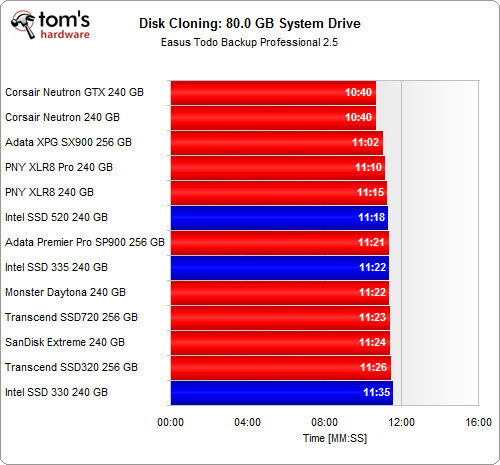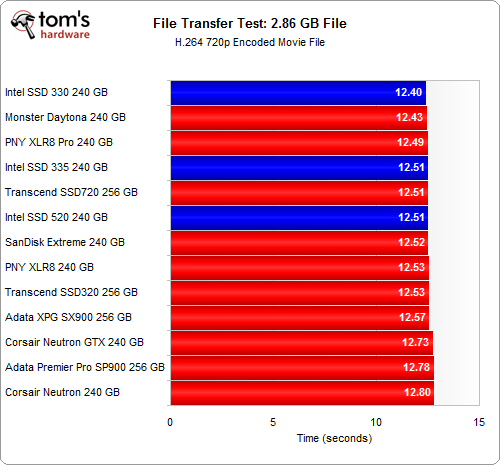Time To Upgrade: 10 SSDs Between 240 And 256 GB, Rounded Up
Real-World Write Testing
We try to hammer this home any time we talk about comparing SSDs: upgrading to any modern solid-state drive is going to give you a better experience than the best conventional disk, regardless of the SSD's position relative to its competition. From there, sure, the benchmarks tell us that certain drives are faster than others. But it gets more difficult to tell them apart.
Nevertheless, we wanted to add real-world write testing to help demonstrate the performance delta between SSDs, even at the same capacity points and using similar controller technology.
In our first test, we clone our system drive (a 240 GB Vertex 3) over to each target drive using Easus Todo Backup Workstation 5.3. The source data comes from my personal laptop, so hopefully it's representative of what many of you have on your machines, too. Aside from the OS, I have hundreds of song files, video content, a handful of games, Photoshop, Office 2010, and a bunch of personal documents. Overall, there's a fairly balanced mix of compressible and incompressible data.
Corsair's Neutron GTX and Neutron take the lead in our first test, unaffected by all of the incompressible data that slows down the SandForce-based drives. But the Neutrons aren't in front by much. Intel's SSD 330 is the "worst" performer, finishing the workload in 11 minutes and 35 seconds. The Neutrons wrap up in 10 minutes and 40 seconds. We ran this test multiple times, and we see variations of up to 10 seconds. So, the differentiation from one drive to another isn't as significant as synthetic metrics might indicate.
This is even more true in our second test, where we copy the 2.86 GB H.264-encoded file that we use for tablet/notebook battery life testing. Even though the source data is not compressible at all, really, the SandForce-based drives end up on top. "What?" you ask. "That can't be right." But we're only moving one file, resulting in a very low queue depth. Throughput is lower in a test like this one, and that applies across the board. Regardless, though, the margin of error for this test is 0.3 seconds, so what we see is a practical tie between 13 different drives.
Get Tom's Hardware's best news and in-depth reviews, straight to your inbox.
Current page: Real-World Write Testing
Prev Page PCMark 7 And Power Consumption Next Page Should You Care About Over-Provisioning On A SandForce-Based SSD?-
mayankleoboy1 get the cheapest, biggest you possibly can. Benchmarks exaggerate the difference between SSD's.Reply -
A Bad Day I agree. Unless if you're buying a glorified USB stick (there is a 128 GB stick) or an SSD with an OC'ed processor, the main factor that consumers should be concerned about is price per gigabyte.Reply -
A Bad Day EDIT: And reliability.Reply
"In order to install a new firmware that significantly boost performance and stability, you must backup all of your data because it will be wiped." -
Tanquen Yea, it’s getting a little out of hand. For 90% of the things 90% of people do on their PC, 200MBs+ read and write speeds just don’t mean much. There are too many other bottle necks going on. I messed around with a RAM drive using most of my 64GB of RAM and the read and write speeds are fun to test (4000MBs or so) but games and VMware sessions I launched from the RAM disc saw no noticeable improvement in launch times or anything else. Same goes for my 830 SSD drive. It’s fast but games and software I use for SCADA development just don’t see any real benefit. They are cool if you want to open 10 sessions of MS Word and 15 Internet Explorer and a bunch of other stuff at the same time but if you just open one instance of Excel and use it and the Photo Shop and use it and then a web browser and use it, you’ll never really see the difference. You have to benchmark it or have two PCs setting right next to each other to see that something started or saved a split second faster.Reply
At least with my 64GB of RAM and actually get 64GB of RAM unlike HDs and SSDs.
-
tomfreak unless the sandforce drive is priced a lot cheaper than the similar capacity non-sandforce SDD. I always choose the non-sandforce SSD. 16GB is a big deal in SSD.Reply -
stoogie until theres affordable 512gb ssd's then i wont get 1, my c drive is 360gb~ and i have 11tbReply -
sna TanquenYea, it’s getting a little out of hand. For 90% of the things 90% of people do on their PC, 200MBs+ read and write speeds just don’t mean much. There are too many other bottle necks going on. I messed around with a RAM drive using most of my 64GB of RAM and the read and write speeds are fun to test (4000MBs or so) but games and VMware sessions I launched from the RAM disc saw no noticeable improvement in launch times or anything else. Same goes for my 830 SSD drive. It’s fast but games and software I use for SCADA development just don’t see any real benefit. They are cool if you want to open 10 sessions of MS Word and 15 Internet Explorer and a bunch of other stuff at the same time but if you just open one instance of Excel and use it and the Photo Shop and use it and then a web browser and use it, you’ll never really see the difference. You have to benchmark it or have two PCs setting right next to each other to see that something started or saved a split second faster.At least with my 64GB of RAM and actually get 64GB of RAM unlike HDs and SSDs.Reply
to see the difference you will need to put the system itself on RAM Disk. not only the installed programs.
-
Where are Samsung SSDs ? Especialy model Samsung 830- 256GB which is on sale in Europe for 160-180€. That is best offer, reliable, faster than basic 840. Get some MB with Z77 chipset and you can RAID them with TRIM support. 2x256 for 330€ is so awesome with 1035Mb/s read in RAID 0. I tested it on Gigabyte Z77-UP4 TH, its a shame that there are only 2x6Gbit ports so 1x840 Pro + 2x830 in RAID 0 is impossible on this MB without SATA2 speed loss on remaining SATA ports. This was my scenario for fast gaming /500GB Steam inventory/ : Raptor, later RAID 0 HDDs, later Velociraptor, next 128GB SSD + 1GB Samsung HDD cached by OCZ Synapse 64GB /totaly unreliable/. So I ended up with 1x boot SSD + 2x SSD in RAID 0. Maybe I am little bit offtopic but any ideas how to "live" with increased Steam inventory and keep it fast enough ? Steamover SW is not reliable for me. Thanks for nice article.Reply
-
ojas ReplyWhen Thomas, Don, and Paul prioritize the parts for their quarterly System Builder Marathon configurations (the next of which is coming soon, by the way)
Wait, SBMs are fine, but where oh where went BestConfigs? -
-Fran- I went for a Vertex4 and placed it in my notebook. What a boost. I'd say it also helped improve battery life.Reply
For a Desktop, I don't have a particular use TBH. I have a RAID0 with 2x512GB WD's and it works amazingly good (and fast as well). I'd say, for desktops, SSDs are still not viable because of price, unless you clench your teeth with loading times or such, hahaha.
Cheers!

